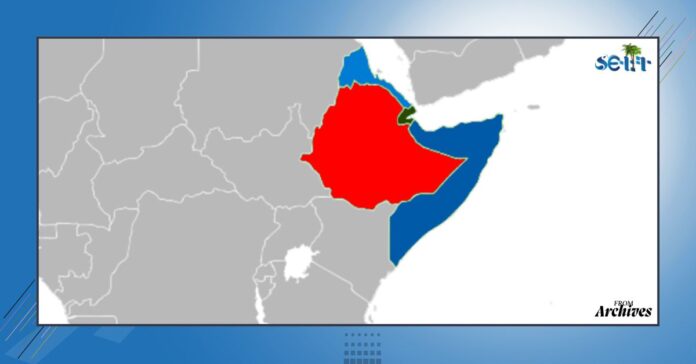The political and security dynamics in the Horn of Africa reveal that Ethiopia is deliberately using social media as a weapon of psychological warfare against its neighbors, particularly Eritrea. This campaign relies on spreading targeted narratives and disinformation designed to influence public perception and destabilize regional relations.
It has now become routine to hear Ethiopian state media outlets such as FBC (Fana Broadcasting Corporate S.C.), ETV, alongside countless YouTube channels and thousands of posts on X (formerly Twitter), echoing Ethiopia’s false claims over Eritrea’s Red Sea coast. Ethiopian academics and revisionist voices repeatedly insist that the younger generation must champion Ethiopia’s “right” to the sea. They frame coastal access as a historic and inherent entitlement, seeking recognition from the international community especially Western leaders and advocacy groups. Their rhetoric emphasizes the need to amplify Ethiopia’s voice globally, ensuring its aspirations receive legitimacy.
This campaign is not simply a bid to appeal to former colonial powers. It is rooted in a distorted reading of history and geography. Ethiopia has long sought to justify territorial claims by courting global powers, often through symbolic displays of subordination. One example is Eritrea’s federation with Ethiopia, a monarchy entrenched in feudalism, which was imposed with U.S. backing yet framed as a UN General Assembly decision. That federation not only absorbed Eritrea portrayed by Ethiopia as a divine possession—but also emboldened claims over Somalia, voiced by Ethiopian delegates during negotiations led by the UK, France, the USA, and the USSR on the future of Italian colonies.
Historical Context
Eritrea’s forced federation with Ethiopia was shaped primarily by U.S. strategic interests during the Cold War. Yet the Eritrean people had long asserted their right to independence, consistent with the principle of self-determination for nations that endured brutal colonial oppression marked by exploitation, discrimination, and genocide. This position was acknowledged by U.S. officials themselves. John Foster Dulles, then U.S. Ambassador to the United Nations, bluntly stated:
“From the point of view of justice, the opinions of the Eritrean people must receive consideration. Nevertheless, the strategic interest of the United States in the Red Sea basin and the considerations of security and world peace make it necessary that the country be linked with our ally, Ethiopia.”
Even while justifying federation, Dulles admitted Eritrea was a sovereign nation with defined borders, a thriving economy, strong institutions, and a dynamic political life. This exposes the weakness of Ethiopia’s claim that Eritrea historically belonged to it. Eritrea was not absorbed into Ethiopia naturally; it was forced into a federation and nearly colonized by an African feudal empire, with foreign powers enabling the process.
Today, Ethiopia’s narrative of historic ownership over the Red Sea is a carefully crafted strategy meant to deceive global opinion and justify unlawful aggression. This propaganda is meticulously designed, blending selective history, manipulated imagery, and inflammatory rhetoric with diplomatic maneuvering. Most troubling are the open threats from Ethiopia’s Prime Minister, amplified by a state propaganda machine running at full force. These threats serve to distract from Ethiopia’s internal crises by shifting focus outward.
How should we fight this madness?
In an era where disinformation shapes global politics, countering it demands clarity, unity, and discipline. Propaganda thrives on emotional reactions, so Eritreans must resist being drawn into irrational debates. Instead, the response must combine national cohesion with active diplomacy, ensuring Eritrea’s voice is heard and respected by sovereign states around the world.
When defending territorial integrity, we must stress that neither population size nor landmass justifies violating international law or the UN Charter. Strengthening public knowledge of these legal frameworks is critical. A well-informed citizenry can dismantle conspiracy theories and counter revisionist narratives with facts and reason.
The guiding principle is straightforward:
“To have a country, you need a strong army. To have a strong army, you need a strong economy. To have a strong economy, your people must be prosperous. To make people prosperous, you need commerce.”
Building a strong, modern military requires addressing Eritrea’s demographic challenges with urgent reforms. Leadership must mobilize both citizens at home and the diaspora to reinvest in Eritrea and revive the stalled economy.
The Red Sea coastline is not just a defensive frontier it is a vital artery for trade and global connectivity. To safeguard it, Eritrea must focus on economic resilience rather than mere poverty alleviation. A strong economy can draw back Eritrean expatriates from across the world, encouraging them to repatriate, invest, and rebuild.
By fostering entrepreneurship and creating opportunities for youth, Eritrea can spark innovation and growth. Economic success will enable young Eritreans to build families and reverse demographic decline, ensuring a sustainable and secure future for the nation.

